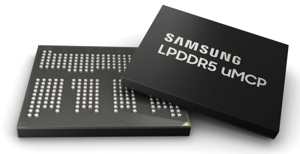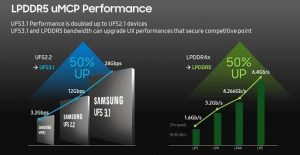Samsung Starts Mass Production of LPDDR5 UFS-Based Multichip Package/uMCP for Smartphones
Integrates LPDDR5 DRAM with UFS 3.1 NAND flash with DRAM capacities ranging from 6 to 12GB and storage options from 128 to 512GB.
This is a Press Release edited by StorageNewsletter.com on June 23, 2021 at 2:32 pmSamsung Electronics Co., Ltd. has begun mass producing its latest smartphone memory solution, the LPDDR5 UFS-based multichip package (uMCP).
The company’s uMCP integrates the fastest LPDDR5 DRAM with the latest UFS 3.1 NAND flash, delivering performance to a broader range of smartphone users.
“Samsung’s new LPDDR5 uMCP is built upon our rich legacy of memory advancements and packaging know-how, enabling consumers to enjoy uninterrupted streaming, gaming and mixed reality experiences even in lower-tier devices,” said Young-soo Sohn, VP, memory product planning team. “As 5G-compatible devices become more mainstream, we anticipate that our latest multichip package innovation will accelerate the market transition to 5G and beyond, and help to bring the metaverse into our everyday lives a lot faster.“
Based on the latest mobile DRAM and NAND interfaces, the uMCP can deliver speed and storage capacity at low power. This combination will allow more consumers to immerse themselves in numerous 5G applications that were previously only available on premium flagship models, including photography, graphics-intensive gaming and augmented reality (AR). Such capabilities are made possible by a nearly 50% improvement in DRAM performance, from 17GB/s to 25GB/s, and a doubling of NAND flash performance, from 1.5GB/s to 3GB/s, over the previous LPDDR4X-based UFS 2.2 solution.
The new uMCP also helps to maximize space efficiency within a smartphone by integrating DRAM and NAND storage into a single compact package that measures 11.5x13mm, allowing more space for other features. With DRAM capacities ranging from 6 to 12GB and storage options from 128 to 512GB, the uMCP can be customized to accommodate the diverse needs of 5G smartphones throughout the mid- and high-end segments.
The firm has completed compatibility testing of the LPDDR5 uMCP with several smartphone manufacturers, and expects its uMCP-equipped devices to hit mainstream markets starting this month.
















 Subscribe to our free daily newsletter
Subscribe to our free daily newsletter

